His Early Life
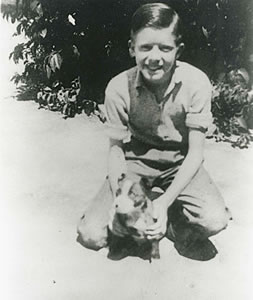
The first president to be born in a hospital, James Earl Carter, Jr. (more widely known as Jimmy Carter), was born in the agricultural town of Plains, Georgia, on October 1, 1924 and grew up in the nearby community of Archery, a rural community west of Plains. His father, James Earl Carter, Sr., was a farmer and businessman. His mother, Lillian Gordy Cater, was a registered nurse. Carter himself is descended from immigrants from southern England, with ancestors who fought in the American Revolution.
He was the oldest of his three siblings. His family moved to Archery to run a peanut farm. When he wasn’t in school, Carter would help out on the farm. At age of five, He began selling peanuts on the streets on Plains. Carter was already demonstrating his independence and talents for business, and of course, he also had flaws. Once he was punished by his father for stealing a penny from the collection plate at church. As a child, Carter once shot his sister Gloria with a BB gun when she threw a wrench at him. Like most the other boys, Carter had his favorite childhood pastime, which was sitting with his father in the evenings, listening to baseball games and politics on the battery-operated radio. He once panned for gold too. At age of nine, he invested his earnings in five bales of cotton which he had stored for several years, then sold at a huge profit which was large enough to enable him to purchase five old houses.
Jimmy Carter was educated in the schools of Plains. He graduated from high school in 1941. He then enrolled at Georgia Southwestern College and the Georgia Institute of Technology. He was a speed reader who could read almost two thousand words in a minute!
Military Life
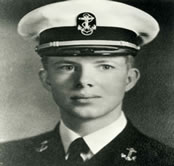
His uncle, Tom Gordy, had joined the United States Navy, and sent postcards to Carter and his family from around the globe. Carter was fascinated with all the exotic places depicted in the cards and started telling his parents that someday he would be in the Navy too. He entered the United States Naval Academy in 1943 and received a Bachelor of Science degree in 1946.
In the navy, Carter became a submariner serving both the Atlantic and Pacific fleets and rose to the rank of lieutenant. As he excelled in electronics and naval tactics, he was eventually chosen to work on the nation’s first nuclear powered submarines. He served in the navy from 1946 to 1963. During the time in which he served the navy, he met Rosalynn Smith whom he married on July 7, 1947 and later had four children.
Back In Georgia

Jimmy Carter had the ambition to become an admiral, but due to his father’s death from cancer in 1953, he resigned his commission in the navy and returned to Plains with his wife to manage the family business. Carter took over the peanut farm and the peanut warehouses that his father had established and enlarged the business. In order to keep up with the modern farming techniques, he studied at the Agricultural Experimental Station in Tifton, Georgia. Carter applied the techniques he studied on his farm and increased production. The family peanut warehouse was soon expanded into a million dollar business.
During his years in Plains, Georgia, Carter played an active role in local civic affairs from 1955 to 1962, taking part on the Sumter County (Georgia) Board of Education, serving as a church deacon, and participating in various other civic organizations. One thing that he believed was: “We should live our life as though Christ were coming this afternoon.” Carter’s involvement in the community and his sense of duty eventually led to an involvement in politics. His interest in politics might have come from his father, who had served for a year in the Georgia legislature. He then believed that he could apply his intelligence and problem-solving skills to issues of government and morality as he had done in the past.
In 1962, Carter ran for the Georgia senate, but lost to his Democratic opponent, Homer Moore. However, it was then proven that Moore had committed voter fraud and Carter emerged victorious. Carter easily won in the general election. In the government he had earned a reputation as one of the most effective legislators and an outspoken moderate liberal. In 1964, Carter was reelected to the state Senate.
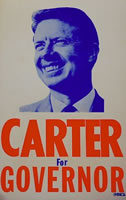
In 1966, Carter decided to run for the office of governor of Georgia. He finished third in a close race. He was disappointed and spiritually broken. After meditation and reflection, Carter put forth much more hard-work and traveled throughout Georgia between 1966 and 1970, studying the state’s problem and making about 1,800 speeches. It was once said by Carter, “It's not necessary to fear the prospect of failure but to be determined not to fail”. In 1970, all the hard-work paid off, Carter won the gubernational election handily.
In his initial address Carter announced his intentions to help all the poor and needy Georgians, regardless of race. That speech got him his first national attention. He called for an end to racial discrimination and extension of a right to an education, to a job, and to “simple justice” for the poor. He once said, “America did not invent human rights. In a very real sense human rights invented America.” During his term, the number of African-American appointees on major state boards and agencies increased from three to fifty-three and the number of African-American state employees rose by forty percent. Furthermore, laws were passed to protect historical sites, conserve the environment, and to encourage openness in government.
During Presidency
Jimmy Carter’s Presidency is remembered for a few accomplishments, and some noteworthy failures. In spite of the negative view of his Presidency, Carter is remembered today as a more favorable light because of his numerous post-Presidency accomplishments.
Jimmy Carter took his first step on the road to the White House in 1972 by becoming chair of the Democratic Governor's Campaign Committee, and then his second step in 1974 by getting himself named as the campaign chairman of the Democratic National Committee. This position gave Carter access to key Democrats nationwide, and the major Democratic gains in the first post-Watergate election added to his reputation. Just before the end of the year, Jimmy Carter announced his candidacy for president. On November 2, 1976 in the general election, Carter ran against incumbent President Gerald Ford, who had been elevated to president when Richard Nixon resigned in 1974. Carter defeated Gerald Ford by 1.6 million votes, winning the Electoral College by 297 votes to Ford's 240, and became the first president from the Deep South since Zachary Taylor in 1849. At that time, he was 52 years old.
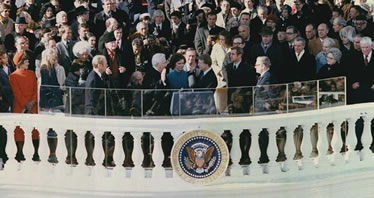
During his first month in office, one of his first acts was to pardon the estimated 10,000 draft evaders who had fled or gone into hiding rather than fight the unpopular war in Vietnam. Although organizations representing veterans who had fought the war condemned the move, Carter considered it a unifying gesture that would signal a shift in foreign policy: the Vietnam era was over. Further, the U.S. government would no longer pursue its Cold War rivalry with the Soviet Union at the expense of the nation's domestic stability.
On April 18, 1977, Carter delivered a televised speech declaring that the U.S. energy crisis during the 1970s was the moral equivalent of war. Carter encouraged energy conservation by all U.S. citizens and installed solar water heating panels on the White House. He and other members wore sweaters while turning down the heat within the White House.
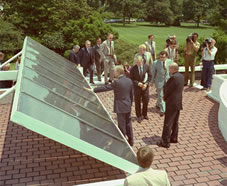
In 1977 Carter attracted worldwide attention and praise for his strong support of human rights wherein he limited or banned entirely any United States aid to nations believed to be human rights violators. Two 1977 treaties dealing with the Panama Canal were also compromised. The first of these gave control of the canal to Panama on December 31, 1979 and the second gave the United States the right to defend the neutrality of the canal. Carter was influential in the Camp David Accords as well as in the creation of a peace treaty between Israel and Egypt in 1979 and in the negotiation of SALT (Strategic Arms Limitation Treaty) II with the Soviet Union, although these negotiations were ultimately delayed by the Soviet invasion of Afghanistan.
Another of Jimmy Carter's first actions upon taking office was cutting the defense budget by $6 billion. He ordered the removal of all nuclear weapons from South Korea and announce his intention to cut back the number of US troops stationed there. Other military men confined intense criticism of the withdrawal to private conversations or testimony before congressional committees. However, in 1977, Major General John K. Singlaub, chief of staff of U.S. forces in South Korea, publicly criticized Carter's decision to lower the U.S. troop level there. On March 21, 1977, Carter relieved him of duty, saying his publicly stated sentiments were "inconsistent with announced national security policy." Carter planned to remove all U.S. troops, with the exception of 14,000 U.S. Air Force personnel and logistics specialists, from South Korea by 1982, but after cutting only 3,600 troops, in 1978, he was forced to bring to an end to all the effort by intense Congressional pressure as well as strong opposition from the military generals.
Carter's most dramatic moments in foreign policy affairs began in November 1979 when Iranian student militants seized the United States embassy in Teheran and took 52 U.S. citizens hostage. The hostages were to be held until the deposed Shah, who was in the United States for medical treatment, was handed over. Carter responded first by cutting diplomatic relations with Iran and stopping all imports from that country. When these measures failed, he ordered an attempt at armed rescue in April 1980, which failed and led to the death of eight marines and the resignation of Secretary of State Cyrus R. Vance. In the end, the crisis lasted for a total of 444 days with the hostages finally being released on January 20, 1981, which was the last day that Carter held office.
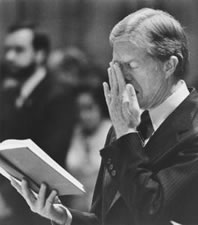
Jimmy Carter was a one-term president. He had made significant foreign policy accomplishments during his administration. He also championed human rights throughout the world. Furthermore, on the domestic side, the administration's achievements included a comprehensive energy program conducted by a new Department of Energy, and finance; major educational programs under a new Department of Education; and major environmental protection legislation, including the Alaska National Interest Lands Conservation Act. However, he also had all sorts of problems during his presidency. He had once said, “I have often wanted to drown my troubles, but I can't get my wife to go swimming.” After he seemed to stumble in the handling of a series of domestic and foreign crises, Carter lost the presidency to California governor Ronald Reagan in the 1980 election, stepping down from office sadly as one of the most unpopular incumbents in U.S. history.
Active after the Oval Office
It was said, “Jimmy Carter was remembered as a good man, if not always a good president.”
Jimmy Carter retired from office in the midst of a barrage of criticism and derision. He was often seen as an incompetent leader during his presidency. But still, Carter's reputation has improved with time. He had always believed in tackling the nation's long-term issues rather than focusing on short-term political ease. By the late 1980s, Carter came into the news again as he championed and worked for the causes he believed in. He committed himself to humanitarian issues around the world and wrote policy books, memoirs, and poetry. After the constant stream of presidential scandals in the two decades following Carter's retirement, Americans finally came to admire Carter's honesty and his unwavering integrity.
After he left the White House in 1981, Carter established the nonprofit Carter Center in Atlanta, Georgia, in which he took an active role in the organization. He raised private funds and public grants for its programs, which ranged from promoting human rights and health care in Third World countries to monitoring democratic elections abroad and maintaining databases of immunization records for Atlanta children. Carter and his wife Rosalynn have also built houses with Habitat for Humanity, which constructed low-income housing around the world.
On December 10, 2002, Jimmy Carter received the Nobel Peace Prize. He was the third U.S. president to become a Nobel Laureate. The Nobel Committee Chairman Gunnar Berge said that Carter's mediation between Israel and Egypt in 1978 was by itself worthy of the prize. He continued on saying that in the decades since, Carter had shown himself to be a supremely worthy Peace Prize Laureate, with his tireless efforts to promote peace, democracy, human rights, and social and economic development throughout the whole wide world.
Even up until today, Jimmy Carter is still working hard for the causes and humanity that he believes in, holding his belief true to heart: “Whether the borders that divide us are picket fences or national boundaries, we are all neighbors in a global community.”